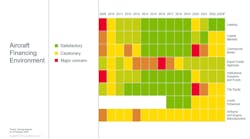Since last year I’ve been traveling around the country giving FAA maintenance safety seminars on the regulations. It was surprising to find that I learn more about regulations from the questions technicians ask me than the knowledge they gain from me.
At a recent seminar, a student asked, “Since you are with the FAA, out of all the rules we went over today, what do you think is the most important rule?
I wish that I’d kept count of the number of people who have asked that question. So many, in fact, that I had a conditioned reflex reply: “They all are.”
That answer may have satisfied the student, but for some reason it didn’t satisfy me any more. On the plane ride home I wondered: Is there a “golden rule” for aviation technicians? One rule that explains all the rest?
Suddenly it came to me – the most important rule is Federal Aviation Regulation (FAR) 43.12, which covers falsification or alteration of maintenance entries. This is one rule which, if broken often enough, could cause the complete failure of the aviation maintenance industry.
Rules such as FAR 43.13, Performance Rules; FAR 91.409, Inspections; or FAR 39, Airworthiness Directives, are heavy-duty maintenance safety rules but don’t compare to 43.12 on a scale of importance.
Why? Because this entire aviation maintenance industry is built on our own personal honor and trust. This characteristic of personal integrity and professionalism forms the very core of the aviation maintenance profession.
We depend on the single idea that each of the 100,000-plus men and women who maintain and inspect aircraft will do it to the highest industry and personal standards.
Think about this. When you make a maintenance entry, and you must each time you exercise the privileges of your certificate, you sign your name and certificate number. By these actions, you not only satisfy a FAR, you give the rest of us in this industry your word of honor. You certify that your work has been done right. Not 50 percent right, not 90 percent right, but 100 percent right.
In return, if this was a perfect world, when you read some other technician’s entry, his word of honor, his written statement should be accepted with a high level of respect. Sadly, this is not a perfect world, so you don’t accept every entry at face value.
You have learned, or will learn, that there are those among us who deliberately falsify records. The important word here to focus on is “deliberately.” That’s why FAR 43.12 was written. It tells that any perversion of this mutual trust among technicians, any selling of one’s honor that would compromise our record system will not be tolerated by the U.S. government.
Why does the government consider the maintaining of maintenance records integrity so important? Records ensure safety. Industry and government recognize that even a total of 5 percent maintenance records falsification in all of the 210,000 aircraft in the fleet would cause the system to collapse.
Who would trust a record system that was only 95 percent accurate? Who among us would trust an aircraft that was only 95 percent inspected, only 95 percent maintained? What passengers would buy a ticket or pilots fly if they could only be assured of a 95 percent chance of getting to their destination in one piece?
Those who falsify records know it’s wrong. They try to rationalize their actions to soften the guilt. They claim they do it for good reasons like meeting a gate time or to keep their job. Or they make promises to themselves to fix it later when they have the parts available, etc., etc., etc.
There is NO EXCUSE that justifies the falsification of aircraft records. Record falsification is a lie! And every lie is like a cancer that eats away at our honor as technicians and at the trust the rest of the industry has in our profession.
This article was first published in the July/August 1991 issue of Aircraft Technician


